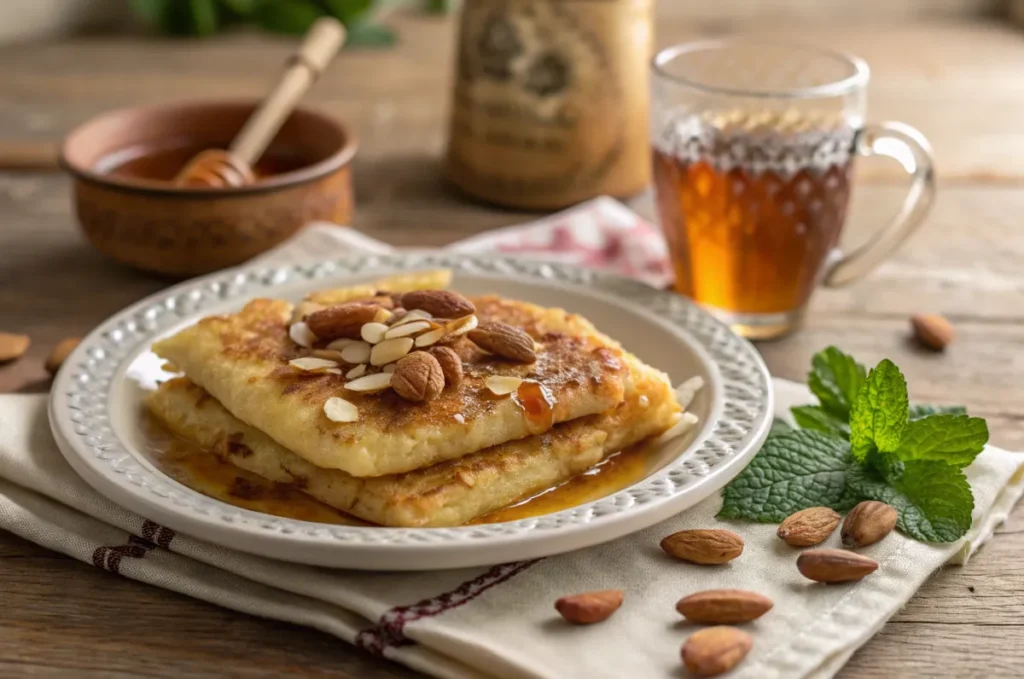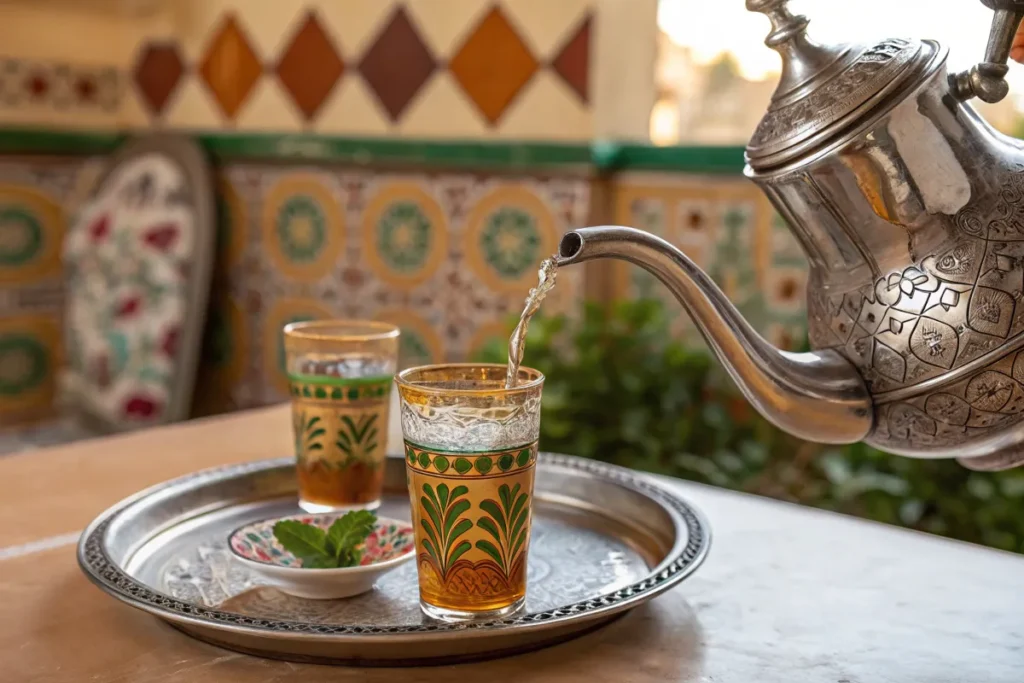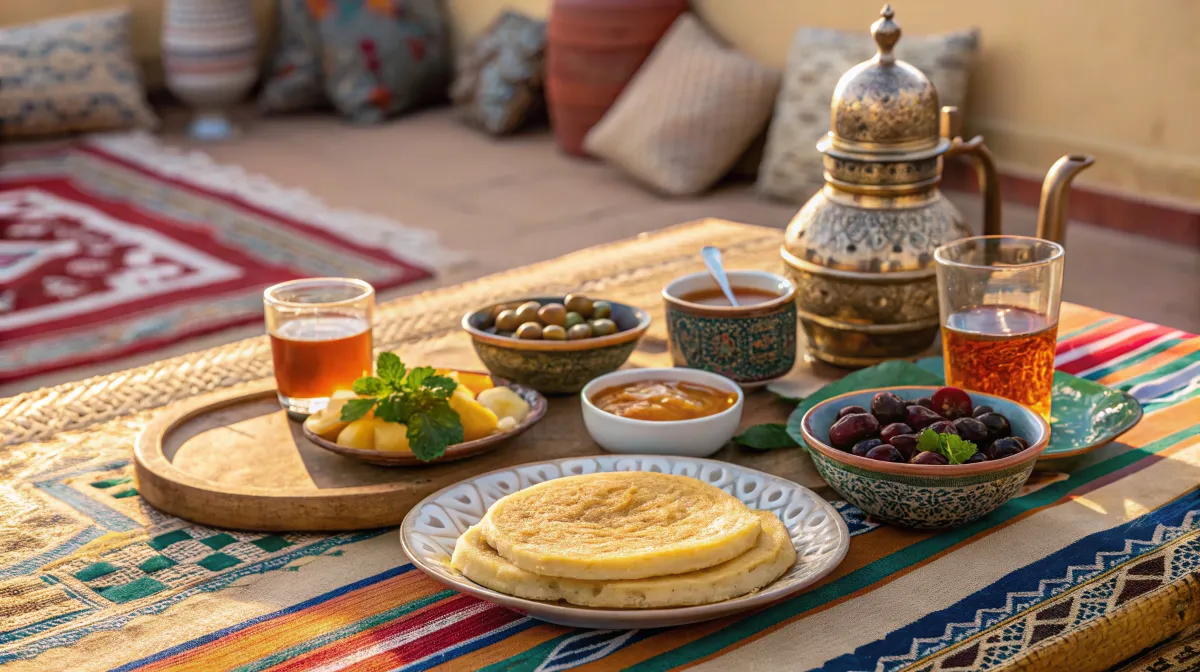When it comes to experiencing the heart and soul of a culture, few things compare to its food. And in Marrakech, the vibrant red city of Morocco, breakfast is more than just a meal—it’s a celebration of flavors, traditions, and togetherness. A Marrakech traditional breakfast is a feast for the senses, offering a delightful mix of sweet and savory dishes that reflect the city’s rich history and diverse influences.
In this article, we’ll take you on a journey through the culinary wonders of a Marrakech traditional breakfast. From the staple foods like msemen and baghrir to the aromatic mint tea that ties it all together, we’ll explore what makes this morning ritual so special. You’ll also discover the best spots to enjoy breakfast in Marrakech, learn about modern twists on traditional dishes, and uncover the cultural significance behind this beloved meal.
So, grab a cup of tea, sit back, and let’s dive into the world of Marrakech traditional breakfast—a feast that’s as rich in flavor as it is in history.
Table of Contents
Introduction to Marrakech Traditional Breakfast
What Makes Marrakech Breakfast Unique?
Imagine waking up to the scent of freshly baked bread, the sound of sizzling pancakes, and the sight of a table laden with colorful spreads. That’s what a Marrakech traditional breakfast is all about. Unlike the rushed coffee-and-toast routine many of us are used to, breakfast in Marrakech is a leisurely affair, often enjoyed with family or friends.
What sets it apart is the diversity of flavors and textures. From flaky msemen (Moroccan pancakes) to creamy amlou (a blend of almonds, argan oil, and honey), every bite tells a story. The meal is a perfect balance of sweet and savory, with dishes like khlea (preserved meat) and eggs adding a hearty touch.
But it’s not just about the food. Breakfast in Marrakech is a cultural experience. It’s a time to connect, share stories, and savor the moment. Whether you’re dining in a bustling café or a quiet riad, the warmth and hospitality of Moroccan culture shine through.
Why Breakfast in Marrakech is a Must-Try Experience
If you’re visiting Marrakech, skipping breakfast would be like going to Paris and missing the Eiffel Tower. It’s an essential part of the Moroccan experience. The city’s breakfast culture is deeply rooted in its history, blending Berber, Arab, and French influences into a unique culinary tapestry.
For travelers, it’s a chance to step into the local way of life. Whether you’re dipping harcha (semolina bread) into honey or sipping on a steaming glass of mint tea, you’ll feel a sense of connection to the city and its people. Plus, with so many delicious options to choose from, there’s something for everyone—even picky eaters!
In short, a Marrakech traditional breakfast isn’t just a meal; it’s a journey through Morocco’s rich culinary heritage. And trust us, it’s a journey you won’t want to miss.
Explore the cultural significance of breakfast in the world
Key Components of a Traditional Moroccan Breakfast
Staple Foods in a Marrakech Breakfast
When it comes to a Marrakech traditional breakfast, the star of the show is undoubtedly the bread. From msemen (flaky, layered pancakes) to baghrir (soft, spongy pancakes with tiny holes), bread takes center stage. These dishes are often served warm, straight off the griddle, and paired with a variety of spreads.

Another staple is harcha, a semolina-based bread that’s crispy on the outside and soft on the inside. Think of it as Morocco’s answer to cornbread, but with a unique texture that’s perfect for dipping into honey or amlou. Speaking of amlou, this rich blend of almonds, argan oil, and honey is a must-try. It’s not just delicious—it’s also packed with nutrients, making it a healthy way to start your day.
Of course, no Marrakech traditional breakfast would be complete without olives and olive oil. These add a savory touch to the meal, balancing out the sweetness of the honey and jams.
Sweet and Savory Pairings
One of the things that makes a Marrakech traditional breakfast so special is the perfect balance of flavors. On the sweet side, you’ll find dishes like baghrir drizzled with honey or msemen topped with jam. These are often paired with amlou or fresh fruit, adding a burst of natural sweetness to the meal.
On the savory side, dishes like khlea (preserved meat) and eggs are popular. Khlea is a traditional Moroccan delicacy made by slow-cooking meat in spices and preserving it in fat. When served with eggs, it creates a hearty, flavorful dish that’s perfect for filling you up.
The Role of Mint Tea and Coffee
No Marrakech traditional breakfast is complete without a glass of mint tea. Known as “Moroccan whiskey,” this sweet, aromatic tea is a symbol of hospitality and is often poured from a height to create a frothy top. It’s the perfect accompaniment to the meal, helping to cleanse the palate and refresh the senses.
While mint tea is the star, coffee also plays a supporting role. Many locals enjoy a strong cup of Moroccan coffee alongside their tea, especially in modern cafés. Whether you prefer tea or coffee, both beverages add a touch of warmth and comfort to the meal.
Top Spots to Enjoy Traditional Breakfast in Marrakech
Café des Épices: A Rooftop Experience
If you’re looking for a Marrakech traditional breakfast with a view, Café des Épices is the place to go. Located in the heart of the Medina, this rooftop café offers stunning views of the bustling souks below. The menu features classic dishes like msemen, baghrir, and harcha, all served with a side of mint tea.
What sets Café des Épices apart is its vibrant atmosphere. The colorful décor and lively vibe make it a favorite among both locals and tourists. Plus, the friendly staff are always happy to explain the dishes, making it a great spot for first-time visitors.
Le Jardin: A Tranquil Garden Setting
For a more relaxed experience, head to Le Jardin. This hidden gem is tucked away in a lush garden, offering a peaceful escape from the hustle and bustle of the city. The menu features a mix of traditional and modern dishes, with highlights like khlea with eggs and Moroccan crepes.
What makes Le Jardin special is its serene ambiance. The sound of birds chirping and the sight of lush greenery create a calming atmosphere that’s perfect for enjoying a leisurely breakfast. It’s the ideal spot to unwind and savor the flavors of Marrakech.
Le Kilim: A Blend of Tradition and Modernity
If you’re looking for a mix of traditional and modern, Le Kilim is the place to be. This cozy café offers a range of dishes, from classic msemen to fusion options like avocado toast with a Moroccan twist. The décor is equally eclectic, with colorful kilims (Moroccan rugs) adorning the walls.
What sets Le Kilim apart is its welcoming vibe. The staff are friendly and attentive, and the menu caters to a variety of tastes. Whether you’re in the mood for something traditional or something new, you’ll find it here.
Hidden Gems for Authentic Breakfast
For those who want to venture off the beaten path, Riad Yima and Dar Cherifa are worth a visit. These hidden gems offer a more intimate dining experience, with menus that focus on traditional dishes.
At Riad Yima, you’ll find a cozy courtyard setting and a menu that features classics like baghrir and amlou. Meanwhile, Dar Cherifa offers a more upscale experience, with dishes like khlea with eggs served in a beautifully restored riad.
Both spots offer a unique glimpse into Moroccan culture, making them perfect for travelers who want to experience the authentic flavors of Marrakech.
Modern Twists on Traditional Breakfast
Fusion Dishes in Marrakech Cafés
While Marrakech traditional breakfast is deeply rooted in history, many cafés are putting a modern spin on classic dishes. Take Nomad, for example. This trendy spot in the Medina offers dishes like avocado toast with a Moroccan twist—think harissa-spiced eggs and a sprinkle of za’atar. It’s a perfect blend of global flavors and local ingredients.

Similarly, Café Clock is known for its creative takes on traditional recipes. Their camel burger might steal the spotlight, but their breakfast menu is equally impressive. Try their baghrir topped with fresh fruit and a drizzle of honey, or their msemen stuffed with cheese and herbs. These dishes honor the essence of Marrakech breakfast while adding a fresh, innovative touch.
Vegan and Health-Conscious Options
For those with dietary preferences, Marrakech has plenty to offer. Gaia, a vegan café, serves up plant-based versions of traditional dishes. Their amlou is made with almond butter and agave syrup, and their harcha is gluten-free. It’s a great option for anyone looking to enjoy a Marrakech traditional breakfast without compromising on their dietary needs.
Another standout is La Famille, a vegetarian-friendly spot with a focus on fresh, organic ingredients. Their menu features dishes like chia pudding with seasonal fruits and homemade granola. While these options might not be traditional, they still capture the spirit of Moroccan hospitality and the love for wholesome, flavorful food.
The Cultural Significance of Breakfast in Marrakech
Breakfast as a Social Ritual
In Marrakech, breakfast is more than just a meal—it’s a social ritual. Families often gather around the table to share dishes like msemen, baghrir, and harcha. It’s a time to connect, share stories, and start the day on a positive note.
This sense of togetherness extends beyond the home. Many locals head to cafés to meet friends or colleagues, turning breakfast into a community event. Whether you’re in a bustling café or a quiet riad, you’ll feel the warmth and hospitality that define Moroccan culture.
The Influence of Berber and Arab Traditions
The Marrakech traditional breakfast is a reflection of Morocco’s rich cultural heritage. The Berbers, the indigenous people of North Africa, have contributed staples like amlou and harcha. These dishes are simple yet flavorful, showcasing the resourcefulness of Berber cuisine.
On the other hand, Arab influences can be seen in dishes like khlea and msemen. The use of spices, preserved meats, and sweet pastries reflects the culinary traditions of the Arab world. Together, these influences create a breakfast experience that’s uniquely Moroccan.
Tips for Enjoying Breakfast Like a Local
Best Times to Eat Breakfast in Marrakech
If you want to experience a Marrakech traditional breakfast like a local, timing is key. Unlike the early-morning rush in many Western countries, breakfast in Marrakech is a leisurely affair. Most locals enjoy their morning meal between 9:00 AM and 12:00 PM. This relaxed schedule allows you to savor every bite without feeling rushed.
Many cafés and restaurants start serving breakfast around 8:30 AM, but the peak hours are usually mid-morning. So, take your time, sip your mint tea, and soak in the vibrant atmosphere.
Etiquette and Dining Tips
When dining out for a Marrakech traditional breakfast, there are a few things to keep in mind. First, don’t be shy to ask questions about the menu. Most servers are happy to explain the dishes and recommend their favorites.
Second, remember that Moroccan hospitality is all about generosity. It’s common for servers to bring extra bread or tea, so don’t feel pressured to finish everything. Finally, tipping is appreciated but not mandatory. A small gesture, like rounding up the bill or leaving a few dirhams, goes a long way.
By following these tips, you’ll not only enjoy your meal but also connect with the local culture in a meaningful way.
FAQs About Marrakech Traditional Breakfast
What do they eat for breakfast in Marrakech?
A typical Marrakech traditional breakfast includes a variety of breads like msemen, baghrir, and harcha. These are often served with spreads like amlou, honey, and olive oil. Savory options like khlea (preserved meat) and eggs are also common, along with a glass of mint tea.
What is traditional Moroccan breakfast?
A traditional Moroccan breakfast is a mix of sweet and savory dishes. Think msemen with honey, baghrir with amlou, and harcha with olive oil. It’s a hearty meal designed to fuel you for the day ahead.
What is a typical Berber breakfast?
A Berber breakfast often features simple, wholesome dishes like amlou, harcha, and seasonal fruits. These reflect the resourcefulness of Berber cuisine and its focus on natural ingredients.
What time do people eat breakfast in Marrakech?
In Marrakech, breakfast is typically enjoyed between 9:00 AM and 12:00 PM. It’s a relaxed, social meal that sets the tone for the rest of the day.
Conclusion: Why Marrakech Breakfast is Unforgettable
A Culinary Adventure Worth Experiencing
A Marrakech traditional breakfast is more than just a meal—it’s a culinary adventure that engages all your senses. From the flaky layers of msemen to the sweet aroma of mint tea, every bite and sip tells a story of Morocco’s rich history and vibrant culture. Whether you’re dining in a bustling café or a serene riad, the experience is sure to leave a lasting impression.
What makes it truly special is the warmth and hospitality that come with it. Sharing a meal with loved ones, chatting with friendly locals, and soaking in the lively atmosphere are all part of the magic. It’s a reminder that food is not just about nourishment; it’s about connection and joy.
Encouragement to Explore and Savor
If you’re planning a trip to Marrakech, make sure to carve out time for a traditional breakfast. Whether you try it at a popular spot like Café des Épices or a hidden gem like Riad Yima, you’re in for a treat. Don’t be afraid to step out of your comfort zone and try new flavors—after all, that’s what travel is all about.
So, the next time you find yourself in the Red City, take a moment to savor the delights of a Marrakech traditional breakfast. It’s an experience that will stay with you long after the last bite.

Marrakech Traditional Breakfast
Ingredients
Method
- Prepare msemen and baghrir by cooking them on a hot griddle until golden brown and flaky.
- Cook harcha in a pan until crispy and soft.
- Prepare khlea by heating it in a pan and setting aside.
- Fry eggs in a separate pan to your preferred doneness.
- Arrange msemen, baghrir, and harcha on a serving platter.
- Serve warm with amlou, honey, olives, and khlea.
- Accompany the meal with strong Moroccan mint tea or coffee.

